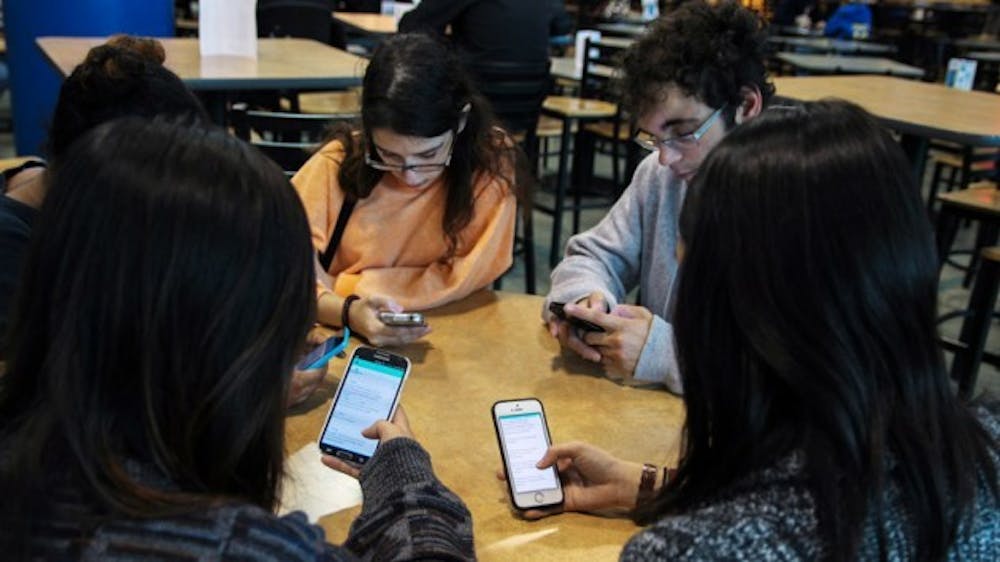When Lindsay Rosenthal is overwhelmed with work and looking for a quick social media break to relax, she doesn’t go on Facebook, Twitter or Instagram anymore.
Rosenthal, a freshman accounting major, turns to Yik Yak.
From musings about boring classes to suspicions of sexual acts taking place during a lecture, the smartphone app has become a hub of anonymous gossip on campus.
Yik Yak, an app that is only a year old, has taken over the phones of many UB students. The app allows users within a five-mile radius to anonymously post messages in a newsfeed-like forum. Yik Yak is aimed at connecting people, specifically college students, through location-based posts.
Tylor Droll and Brooks Buffington, two Furman University students, launched the app at the end of last year as a way to “deliver a unique social networking app that takes social interactions to the next level.”
Rachel Brous, a sophomore philosophy and psychology major, uses the app to stay up-to-date and find out what’s going on around campus at any given time. Her favorite post was one about a female student giving a male student a hand job during class – other students have posted bragging about places on campus they’ve had sex in public.
Typically students at UB post about things going on during their classes, their dorm life experiences and parties.
According to Justin Nunez, account director for Yik Yak, Droll and Buffington identified a need to create conversations and build communities without prerequisites such as prior relationships or connections.
“With a majority of citizens communicating via mobile devices, Yik Yak’s founders recognized the importance of a localized forum that could be open to anyone to discuss events, issues and general happenings in the area,” Nunez said. “Yik Yak is the only way to create a localized social forum without prior relationships or friendships for the purpose of delivering relevant, timely content to hyper-local areas of people, whether it be a weather warning or emergency news.”
Six months ago, Yik Yak reported the app had over 240,000 users, according to USA Today. Like many social media platforms, the anonymity of Yik Yak has an increased risk of cyber-bullying and harassment. Yik Yak began geo-fencing – creating a virtual barrier that restricts real-world geographic areas from using the app – nearly all primary and secondary schools.
“Yik Yak recognizes that with any social app or network, there is the likelihood for misuse from a small group of users,” Nunez said. “The company has put specific algorithms in place to prevent this from happening.”
The app is rated 17-plus in app stores to ensure the user base is age appropriate and parents can easily block the app on their children’s phones. Additionally, the app monitors conversations and posts, and any negative or harmful behavior will result in the respective user being blocked or altogether banned from future use of the app.
“Yik Yak continues to build out this technology to ensure positive interaction,” Nunez said. “We’ve found that as more users sign up and start using the app, each community begins to self-regulate itself in a positive way.”
Although some users may post inappropriate or embarrassing things, Rosenthal believes the app’s anonymity allows people to connect with one another in a way that they may not have been able to before.
“Many people at UB use Yik Yak to express their thoughts and feelings,” Rosenthal said. “Yik Yak shows us when other people [are experiencing] or feeling the same way that we do, which is pretty cool.”
Users post comments, similar to Twitter, and the posts are then shared to a newsfeed. Other users can then either “vote up” or “vote down” the posts they read and based on how many votes a post gets, it moves up or down the newsfeed. Posts that are “voted up” the most appear at the top of the newsfeed, while posts “voted down” the most appear at the bottom.
Although the app allows users to post nearly anything they want, Brous thinks the app creates a surprisingly honest forum that relates to students’ experience on campus.
Austin Brown, a sophomore accounting major, saw great potential for Yik Yak when he downloaded the app earlier this year. He decided to apply to become a campus representative for Yik Yak and help promote the app at UB.
“I was interested in helping Yik Yak grow as a social media app,” Brown said. “As a representative [my responsibilities include] hanging up flyers around campus, setting up tables and handing out Yik Yak giveaways, such as koozies, pens and stickers.”
Brown is currently the only UB representative for Yik Yak and works toward marketing Yik Yak on campus and increasing its overall users at UB.
“With Yik Yak, it’s particularly valuable for college campuses because of the hyper local aspect,” Nunez said. “Negative comments are a reality, but that is most often the work of a small minority. The value far outweighs the misuse in each region.”
Although the anonymity of the app provides opportunity for misuse, it’s what makes Yik Yak different and popular on UB’s campus.
“My favorite part about Yik Yak is the anonymity of it. You could post 50 things in a row with different emotion and context, and no one would know it was the same person,” said Chris Kozlowski, a senior business major. “It lets you fully express yourself without any link to who you are.”
Nunez said the company expects to continue to grow the app. It continues to scale up the product and work on the technology. He said users can look forward to better interaction features within the coming year.
email: features@ubspectrum.com





